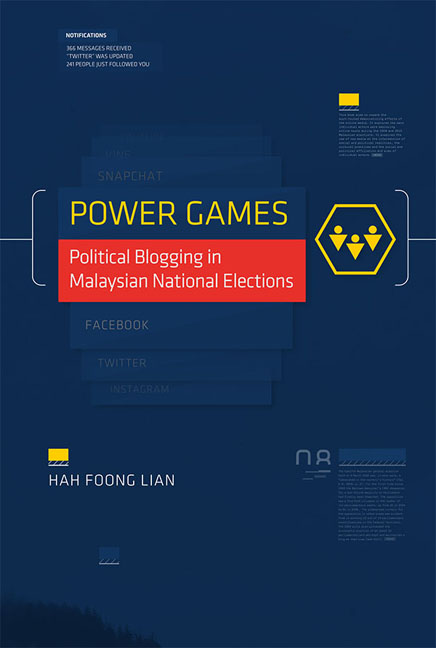Book contents
- Frontmatter
- Contents
- Acknowledgements
- List of Abbreviations of Political Parties
- Introduction
- Chapter 1 The Cultural, Social and Political Fabric of Malaysia
- Chapter 2 Trends in Social Media Use in Malaysian Cyberspace
- Chapter 3 A Political Marketing Tool and a Network of Cyber Battles
- Chapter 4 Psychological Warfare and Leadership Change
- Chapter 5 Negotiating Political Reform and Change
- Conclusion
- Bibliography
- Index
- About the Author
Chapter 1 - The Cultural, Social and Political Fabric of Malaysia
Published online by Cambridge University Press: 05 July 2016
- Frontmatter
- Contents
- Acknowledgements
- List of Abbreviations of Political Parties
- Introduction
- Chapter 1 The Cultural, Social and Political Fabric of Malaysia
- Chapter 2 Trends in Social Media Use in Malaysian Cyberspace
- Chapter 3 A Political Marketing Tool and a Network of Cyber Battles
- Chapter 4 Psychological Warfare and Leadership Change
- Chapter 5 Negotiating Political Reform and Change
- Conclusion
- Bibliography
- Index
- About the Author
Summary
This chapter starts with a brief background of the society of Malaya before it became a British colony, the struggle for independence in 1957 and the policies formulated after the race riots of the 1960s. This brief depiction provides an understanding of the dominance of the Malay community with the United Malays National Organisation (UMNO) holding political power as the dominant partner in the Barisan Nasional (BN) ruling coalition. It highlights the race-based politics and culture of political patronage that have existed up until the present day. A brief historical account of the social, political and economic forces that contributed to the country's multi-ethnic and multicultural environment provides a backdrop to the use of new media in the Malaysian context.
One of the defining moments in Malaysia's recent history is the race riots of 13 May 1969, which occurred after the dismal performance of the ruling regime in that year's national elections. A brief discussion is dedicated to this period and its aftermath, particularly the creation of the New Economic Policy (NEP) that has been in place since the early 1970s. Certain key elements of the policy will be highlighted to provide an indication of their impact on the country's economic and political system. The policy has drawn wide-ranging responses from political analysts, some of whom have attributed the creation of the Malay middle-class to this policy while others considered it to be a form of racial discrimination. The policy is seen as having an unequal impact on people's lives in areas such as education, housing and employment because preferential treatment is afforded to the bumiputera (sons of the soil or indigenous people, or more commonly referring to Malays). Yet, other critical scholars argue that the policy has witnessed an emergence of political patronage where preferential treatment is not only given to the Malays in general but more so to bumiputera who are members of UMNO, the country's dominant political party (Ho 1988; Gomez and Jomo 1997). Tracing the links of those bumiputera businessmen who secured multimillion ringgit projects in the country to political elites in UMNO, the scholars asserted that it was a part of the culture of political patronage that grew out of the NEP.
- Type
- Chapter
- Information
- Power GamesPolitical Blogging in Malaysian National Elections, pp. 21 - 54Publisher: ISEAS–Yusof Ishak InstitutePrint publication year: 2016



